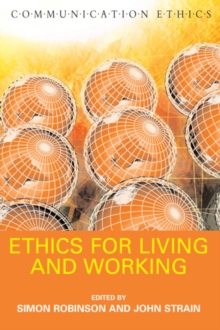In this work, Botin begins by reflecting on the development of electronic records in the Danish healthcare system.
Richard Cooper takes the theme of electronic health records into the field of pharmacy.
On the face of it both of these would seem to provide a way of improving service.
However, the more we use technology the more it is important to examine underlying values and ethical issues, and this leads to an increased focus on developing and maintaining the autonomy and responsibility of the patient or customer.
Rolv Blaker, Eileen Nafstad and Norman Andressen then take the focus to psychology.
Blaker directly addresses the ideology that may be predominant in a society and thus may be reflected in any professional practice whereas Norman Anderssen and Ingrid Dundas take this further in analyzing underlying ideologies in teaching research methodology in psychology.Hilde Eileen Nafstad in the following chapter takes this theme to a more profound level by focusing on the ideology-based assumptions in research on human suffering, concretized by studies of Post Traumatic Stress Syndromes in relation to war experiences.
Simon Robinson invites us to look at the moral context of employability and Elizabeth Ozorak looks at the world-views and values underlying the student experience of 'service' or volunteer learning.
Bruce Macfarlane takes the debate further in chapter eight by focusing on the academic profession and the idea of academic citizenship.
Derek Sellman takes this theme and applies it to the profession of nursing while Joan Whitman Hoff in her chapter takes us into what still for many people is uncharted ethical territory, the world of IT as it used in teaching.
Suzy Jagger's chapter focuses on the teaching of computer ethics.
Like Sellman she wants to focus on the moral development of the students and looks to how this might be charted.Development, ethical development or any other, involves change and John Strain considers whether we ought to take history more seriously in the ethical education.
In an age which is persistently confronted with innovation, it is understandable that ethics is regarded as something that people will find compelling on account of its innovative character.
This book then argues that Applied and Professional Ethics is not to be confined to any predetermined shape.
Along with the dilemmas and the theories there are those underlying values and world views that are of equal importance in creating ethos and community, and in enabling creative response.
Such values are there at the heart of virtue ethics. Because of the plurality of the educational and professional community, values and perspectives and assessments of values differ and thus dialogue is at the heart such ethics.This book suggests that the teaching of Applied and Professional Ethics has to engage at all these levels, and thereby both take seriously all aspects of ethics, for living and working.
All of these chapters began their life as either keynote lectures or papers at the Second International Conference on Teaching Applied and Professional Ethics in Higher Education, the 'Real World - Real People Conference: Ethics in a Virtual World' , London, 30th August to September 1st, 2005.

